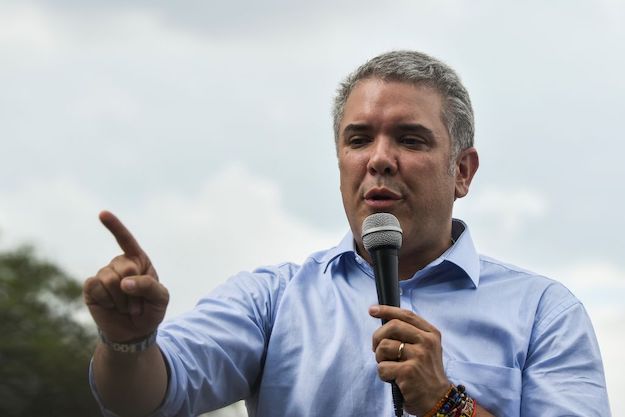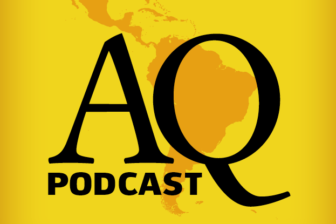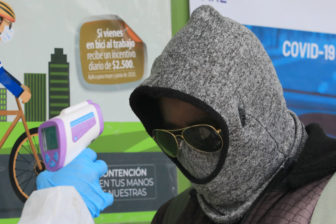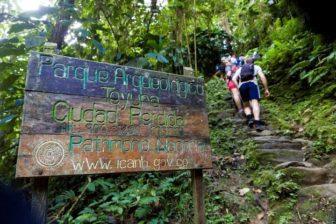BOGOTÁ – After 16 somewhat aimless months in office, Colombia’s President Iván Duque found his footing during the early stages of the coronavirus pandemic. His handling of the crisis – with deaths and a caseload well below most of Colombia’s neighbors – helped increase Duque’s approval ratings to the highest of his presidency.
But the president is now betting on an economic reopening that carries health and political risks – and his opposition has re-emerged, along with the typically confrontational tenor of Colombian politics, after weeks on the sidelines. Whether or not Duque’s gamble pays off may well set the tone for the rest of his government.
How he got here
As the first cases of coronavirus were confirmed in Colombia in March, Duque was in the political doldrums. His approval ratings were below 30% in most polls, and he faced pressure on a variety of fronts. Accusations of vote buying during his presidential campaign in 2018 were starting to surface. A national strike beginning in November 2019, over a laundry list of grievances including changes to the pension system, was still roiling Colombian politics. Congress had recently forced his defense minister to resign, and a budding corruption scandal involving the illegal wire-tapping of journalists, NGOs and opposition politicians was international news.
But at a time when leaders across the continent openly disregard science and technical expertise, Duque has proven himself to be quite the opposite – and in the middle of a global pandemic, that approach has paid off. Duque has left technical questions to a host of health experts, not only in his ministry of health and the national health institute, but also among academics and international health researchers.
A savvy media strategy aimed at boosting solidarity and encouraging people to abide by government isolation measures has also given Colombians the sense of a government in control. Everyday on the government’s social media platforms, Duque speaks to experts, ministers, allied presidents or even famous artists and sports stars on the pandemic and what measures are needed to combat it. This messaging has been backed up by policy – with an early and strict lockdown and around 100 presidential decrees, all carrying the force of law, to alleviate and deal with the effects of the outbreak. These have included scores of measures to relieve the tax burden on businesses and individuals, often through subsidies, and to create new social program for the most vulnerable.
The overall effect has a decisiveness and clarity of vision that Duque had not displayed over his previous year and a half in government. His approval ratings reached 52%, the highest of his mandate so far.
Politics have also helped. Congress wasn’t in session at the beginning of the pandemic, and has since met in only a languid virtual forum. With congressional opposition relatively subdued, the bureaucratic machinery of the state has taken the place of Duque’s governing coalition – offering far more public and institutional support in enacting policy than he had enjoyed under more normal circumstances.
A new regional strategy
Coming off the worst quarterly economic contraction in Colombia’s history – and with unemployment rates rising steadily – Duque has started to allow businesses to reopen. But as they do, there is a risk that some political gains – and the cautious, technocratic image that the president has finally started to cultivate – could be short-lived. Colombians are now debating both whether Duque closed down the country too quickly and as whether he is easing restrictions too soon.
This is not least because the president has taken steps that no longer fall in line with strict health official recommendations. In practice, Colombia is no longer in quarantine. A gradual restart has allowed businesses from construction to hair salons to reopen along with bio-security measures to try to limit and additional spread of the virus. Officially, 19 million people are back out of the house – though the true number, given the size of the informal economy and the number of people who simply ignore social distancing guidelines, is likely much higher.
Duque’s approach has been one of “intelligent, preventive isolation” – a logistically complex strategy that entails regionalizing lockdown measures according to risk. Cities with a relatively good coronavirus outlook are able to reopen while the executive branch, the health and interior ministries, and local officials monitor progress to make sure that numbers don’t jump.
This strategy has worked well in the department of Antioquia and its capital Medellín, a successful example of pandemic management and what a safe “new normal” can look like.
But other major cities have not been so lucky. After reopening, Cali has again reached 200 new cases per day. Cartagena has had to re-close entire neighborhoods. The departments of Atlántico, on the Caribbean coast, and Chocó, on the Pacific, governments have had to reinstate total lockdowns.
Opposition politicians are no longer showing much patience. Claudia López, Bogotá’s mayor and a more pedagogical and histrionic leader than Duque, has been harshly critical of the president’s efforts to reopen. She argues that a full lockdown should have been in place for at least three months, and says that the national government has effectively ceded responsibility for any increase in the virus to regional and local leaders.
Duque, in turn, has doubled down. On June 19, he allowed scores of businesses affected by the pandemic to sell products without VAT tax, which immediately led to Black Friday-like scenes in some shopping centers. The decision was all the more controversial because studies suggest it’s not clear that the VAT holiday will be effective in restarting the economy.
While Duque’s government says that shopping crowds were far more limited than a few outlier examples suggest, epidemiologists have warned of a possible return of the virus as a result of the decision. Duque says he will keep going, and repeat VAT holidays twice more in July, though with more significant social distancing measures in place and added incentives to encourage e-commerce.
If Duque’s gamble pays off – and Colombians are able to slowly get back to business without it provoking a new surge in coronavirus cases – the second half of the president’s term may yield more tangible results than the first. If it backfires, and the coronavirus returns, the scandals and controversy that plagued him early on (and indeed never truly disappeared from Colombian news coverage) will only grow louder.
—
Duque (no relation) is a Colombian journalist who has covered upper levels of government for 10 years, and who covers Iván Duque’s administration for La Silla Vacía. Follow her on Twitter @KarenDuque







